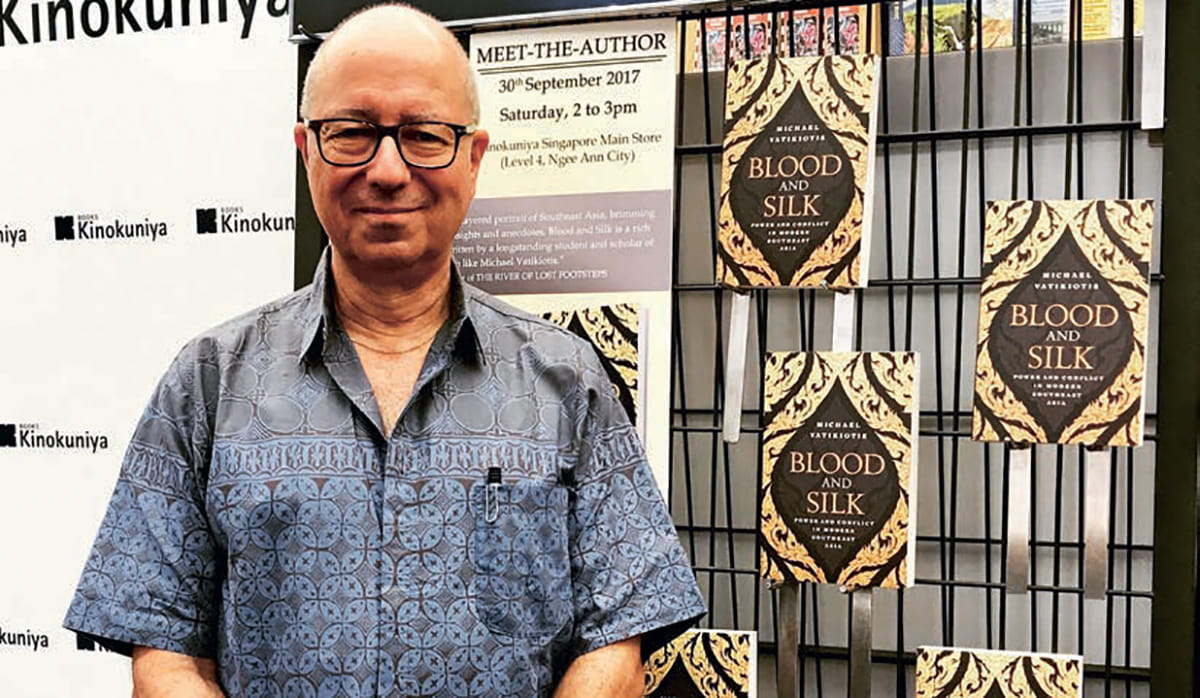Stories > An Oasis of Calm
An Oasis of Calm
Michael Vatikiotis, whose job is to mitigate high-level conflicts, shares how it’s the little things that make Singapore his personal refuge.
BY LOW SHI PING
PHOTOS MICHAEL VATIKIOTIS

Vatikiotis is also an accomplished writer; in addition to several novels, he regularly contributes to various international and regional newspapers, as well as Al Jazeera and the BBC. He is a member of Asia Societyʼs International Council, and an advisor to the Asia Literary Review. His latest book, Blood and Silk: Power and Conflict in Modern Southeast Asia, discusses in part his work as a peace negotiator.
welve years in Singapore have given Michael Vatikiotis a lot to think about and appreciate. Looking back, he observes that the country has evolved a great deal since he arrived in 2005.
“It was small, with a rather inward-looking community, and conservative in many ways,” Vatikiotis says. “The biggest change since then is the influx of foreigners who’ve come here for professional reasons. I’ve seen a change in the makeup of society, with an increase in outsiders. The city is noticeably crowded now and is more outward-looking.”
Previously based in Hong Kong, the British national moved here to take on the role of Asia regional director at the Centre for Humanitarian Dialogue (HD), a non-profit Swiss-based private diplomacy organisation that supports peaceful settlements worldwide by initiating dialogue and mediation. With much of HD’s peace-making work focused within South-east Asia, such as in Thailand, Myanmar, Indonesia, and the Philippines, Vatikiotis knew he would be well-placed in the heart of the action. He notes with some relief, however, that this island state has never needed HD’s involvement to resolve any conflicts. Singapore is not without its challenges, he says, but what it faces are nothing like the ones he deals with in his work.
He cites Singapore’s political scene as one example. He has now observed two of Singapore’s general elections from close quarters, and notes that despite concerns things might get out of hand, the reality was always quite peaceful.
Vatikiotis recognises the 2011 General Election as a watershed. “There was a sea change in the way people reacted to the campaigning. Since then, the Government has responded and adapted to what the citizens want from it, and so the 2016 election was less interesting,” he says. What he feels has held constant is the Government’s efficiency. “It makes for more comfortable lives for everyone, but less interesting politics. What Singapore has achieved is a vibrant city-state, with an economy that ticks over rather well and keeps most people happy.”
“For Me, Singapore Is About Family, Close Friendships, Living Spaces, And The Ability To Live Comfortably And Enjoy The Amenities Of A Well-planned City.”
Michael Vatikiotis
Adds Vatikiotis: “There is nothing here that gets in the way of my work. Singapore is a great place to be based regionally, plus it has the best airport in the world.” His two adult children also live and work here.
Another thing that has impressed him is the multiracial nature of the society, and how people from different races and religions live harmoniously alongside one another. He doesn’t see the sort of problems here that he’s noticed in parts of other South-east Asian countries, he says.
He also references the rise of China and Singapore’s position as a city with a Chinese majority, relative to this development. “China might try to assert some sort of economic and financial control and dominance over Singapore. But it’s too early to say how this might play out.”
And as for more localised issues and quirks that have caught his eye, he observes: “I do think that in the future, Singapore will face the problem of how much longer it can continue to grow at the pace it is doing so now, without becoming overcrowded.”
There is also the local penchant for eating out often. “It seems to stem from a deep cultural urge to congregate in hawker centres; sadly I do not share the view that the food is great,” he says with a grin.
In his time here, Vatikiotis has made many firm friends with academics and diplomats working in organisations such as the Ministry of Foreign Affairs, the S. Rajaratnam School of International Studies, and the Institute of Southeast Asian Studies.
Among them are ambassadors-at-large Ong Keng Yong, Tommy Koh, and Bilahari Kausikan. Others are academics like Joseph Liow and Kishore Mahbubani. “They are professional friends – people I’ve got to know because of my work. We go back a long way, 30 to 40 years,” he says.
He has had mutual exchanges with them, sharing knowledge and understanding, which helps facilitate his work at HD. Liow, in particular, has been a great personal help. “He lent a sympathetic ear to my early efforts at building an organisation in Singapore, and provided me with more than one talented Singaporean to work with.”
Asked how he thinks his Singaporean friends view him, Vatikiotis responds: “I imagine they consider me a bit of a sceptic on everything.”
On a more serious note, he suggests that as the world moves forward into an increasingly uncertain future, Singapore should remain focused on its strength as a hub, specifically in finance, trade, health, arbitration, and education.
Keeping that up will allow organisations like HD, and individuals like him, to continue remaining attracted to it.
“I live in Upper Thomson and have access to the green spaces nearby,” he says. “For me, Singapore is about family, close friendships, living spaces, and the ability to live comfortably and enjoy the amenities of a well-planned city.”
